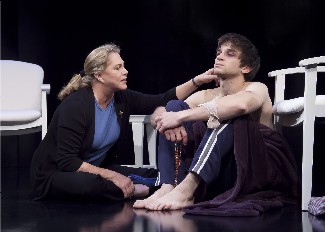Fuse Theater Review: Not “High” Enough
High’s set-up is simple enough—three characters with billboard-sized guilt complexes collide.
High by Matthew Lombardo. Directed by Rob Ruggiero. At the Cutler Majestic Theatre, Boston, MA, through December 11.
By Bill Marx.

Sister Jamison Connolly (Kathleen Turner) and Cody Randall (Evan Jonigkeit) exchanging confidences in HIGH by Matthew Lombardo. Photo credit: Lanny Nagler
Some earnest melodramas resemble the TV show I’ve Got a Secret. For all of their writhing and striving for significance, they put the audience into the position of baffled contestants trying to figure out what “unknown known” a special guest is hiding. Matthew Lombardo’s High comes off as a standard, distinctly old-fashioned example of the type: he brings in the Catholic Church to raise the spiritual ante, but the emphasis remains on the creaky mechanics of the soul-searching whodunit rather than taking on the challenge of delving deeply into why God made creatures who give into the urge to self-destruct.
The set-up is simple enough, though the script’s contrivance ultimately undercuts any potential for unruly conflict. Three characters with billboard-sized guilt complexes collide: Father Michael Delpapp brings the 19-year-old drug addict and street hustler Cody Randall to Sister Jamison Connelly for help. Randall is in danger of going to prison—he may have somehow been involved in the suicide of a 14-year-old boy—but for some reason, the priest passionately insists that Connelly, not the authorities, take on this very difficult counseling case, despite her sensible protestations. The inevitable revelations before God and audience, amid proclamations of helplessness, follow like clockwork—confessions are made, crimes admitted, fears trotted-out, and guilt expiated.
Even the whiskey-soaked voiced Kathleen Turner playing Connelly, a foul-mouthed nun going mano a mano with a conniving, young demon who at one point takes off his clothes and tries to seduce her (an amusingly gratuitous nude scene), can’t raise the proceedings above the puritanically well-meaning, a dreary sociological familiarity. Turner chews with furious concern on this meaty role, which explores if religion is more of a crutch than The Truth, but the predictability and moral ambiguity of the figure dampens the actress’s efforts to create a portrait of soul-battling torment. Tim Altmeyer’s Father Michael Delpapp conveys an agile duplicity, though his final speech comes off as damp squib given the script’s build-up. As the drug-obsessed Cody Randall, Evan Jonigkeit never gets at the character’s diabolical energies: he is petulant rather than electrifying.
Surprisingly, in a play that mentions the Devil, there is no striking evocation of evil, of the nastily irrational side of existence (aside from the umpteenth retelling of the venerable “scorpion killing himself and the frog” story. Can’t we retire that one?). Lombardo’s characters are misunderstood or mistreated— we are all earth-bound victims searching for solace. Rob Ruggiero’s direction follows suit, emphasizing telltale clarity and tough talk about nuns and priests over psychological complexity.
Thus for all of High’s intimations of damnation amid the uncertain search for grace, the drama is essentially soft-hearted and determinedly secular. The crux of the matter isn’t so much a ambivalent lapse of faith or a failure of love but a tragic dereliction of duty. High is not about the inscrutability of God and the sinful nature of man—it is about what happens when professionals misbehave. Before the highfalutin thrashing about sin and salvation, somebody should have called the police.
